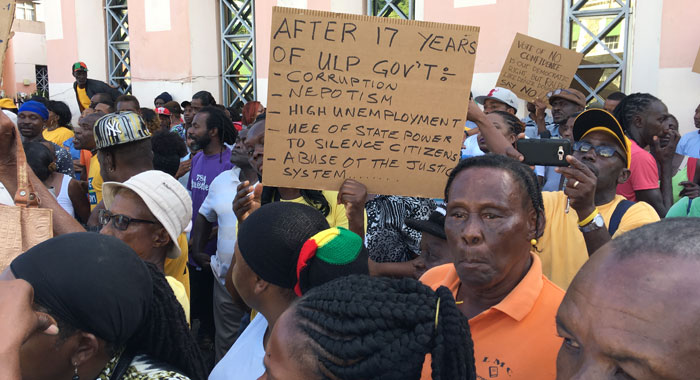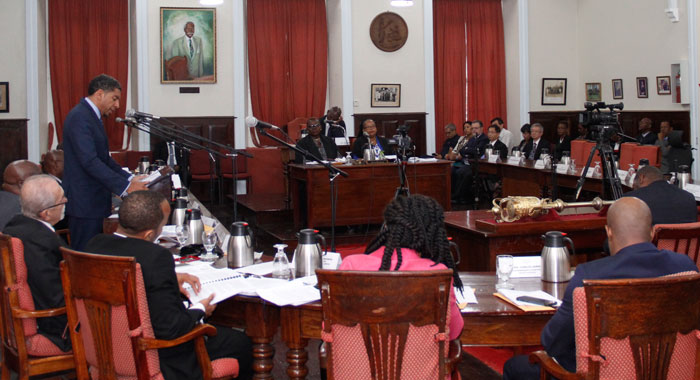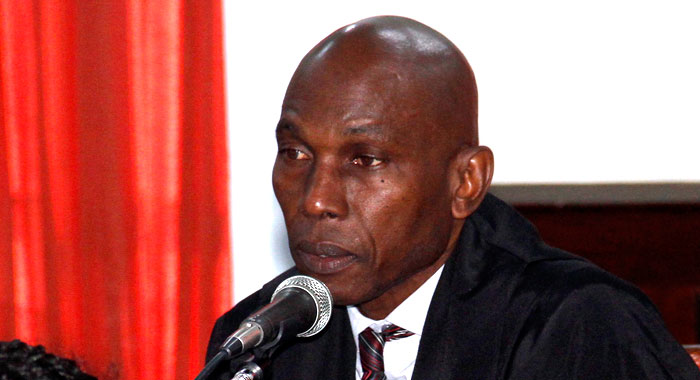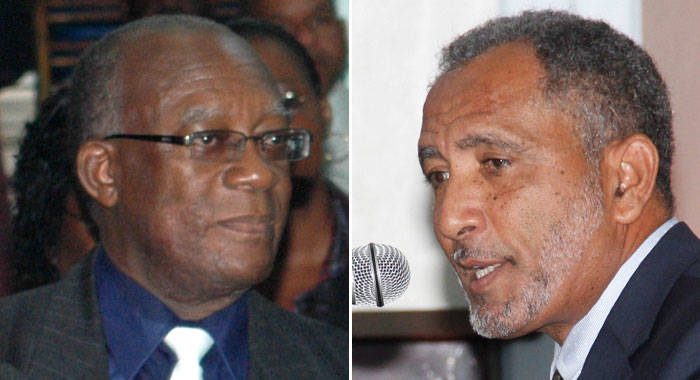Leader of the Opposition Godwin Friday says he disagrees with the view of prominent lawyer Parnell R. “PR” Campbell that opposition lawmakers should have debated the motion of confidence in the government last week Wednesday, Jan. 31.
“These two motions are opposite sides of the same coin,” Campbell — an estranged member of the New Democratic Party (NDP) — said Monday in his weekly programme, “The Law and You”, broadcast on SVGTV.
Campbell, a queen’s counsel, was commenting on the developments in the national assembly when the opposition was scheduled to debate a motion of no confidence tabled two days earlier.
After House Speaker Jomo Thomas ruled against the government’s claim that the opposition needed majority support to bring the motion, he allowed an amendment that made the motion one of confidence in the government.
The opposition did not return to the post-luncheon session of the Parliament during which the government senators debated and adopted the motion in a session that Member of Parliament for Central Kingstown, an NDP lawmaker, said amounted to “political masturbation”.
Campbell is a former Member of Parliament and Attorney General under the NDP who has maintained his formal membership of the party although his political ties seem to have waned.
“… in my view, there was nothing in either of these motions that both the opposition and the government could not have debated what they came to debate without changing a word, except when it came to the voting,” he said after reading both motions to his viewers.
He noted that he was giving his legal opinion on the law, and his political opinion on the politics of the development, but added, “I am not saying I would have the last word.”
What’s the consequence?

But Friday, who is also president of the NDP, disagreed with Campbell’s position, telling a party media conference on Wednesday, “Well, you show me in the Constitution where it says that there is a consequence for debating a motion of confidence.”
Friday, who is also a lawyer, noted that Section 47 of the Constitution talks about a motion of no confidence.
“It says if the motion carries there are certain consequences,” the opposition leader said.
Campbell said that he disagrees with the opposition’s claim that what the government produced was a different motion rather than an amendment.
“Well, I beg to differ because an amendment hasn’t got to follow the exact wording but it has to follow the sentiment of the challenge. But you would expect that on a no confidence motion, the opposition would be saying that the House has no confidence in the government, you would expect the government to be saying that the house has full confidence in the government,” Campbell said, suggesting that it was merely a matter of perspective.
The retired politician cited Standing Order 31(1), which says, “Where any motion is under consideration in the House, or in a committee thereof, an amendment may be proposed to the motion if it is relevant thereto.”
Reading from the 20th edition of Erskine May’s treatise, which is regarded as the Bible on parliamentary proceedings, Campbell said, “The object of an amendment may be either to modify a question in such a way as to increase its acceptability or to present to the house a different proposition as an alternative to the original question.”
During last week’s debate, it became clear that there are some fundamental differences between older and more recent versions of the May treatise, which is now into its 24th edition.
Campbell said that those in the legal system would be quite aware of the concept of an amendment.
“An amendment may take various forms but where the government is facing a motion of no confidence, it is a common technique that governments use all over the world of proposing an amendment to the opposition’s no confidence motion, to express confidence in the government,” said Campbell, who had been a government MP when Ralph Gonsalves, then as an opposition lawmaker, had brought motions of no confidence against the government, including one less than two years after he (Gonsalves) was elected as an opposition member of parliament.
Estimates, Budget as no confidence motions

Campbell further said he wanted to introduce into the public discussion a point that he had not heard anyone talk about as yet.
“Do you know that the debate on the Estimates and subsequently the budget debates are in fact two debates of confidence or no confidence in a government?
“Our Constitution makes it a must for the government to come to parliament every year to propose estimates and to propose an [appropriation] bill, which we popularly call the budget.
“… And, according to Parliamentary tradition, any government that loses a vote on the Estimates or on the Appropriation Bill had to resign because the vote on the appropriation bill and the vote on the estimates are regarded as tests as to whether the government commands the support of a majority of the house of assembly.”
“So, to bring a no confidence motion on the same day that the Estimates are down for debate is to be duplicating the attacks on the government because when an opposition attacks an Appropriation Bill and the Estimates, it is saying that this government has lost credibility, has lost its majority…”
Constitution explicit about no confidence motions

Meanwhile, Friday told his press briefing that that in some jurisdictions, the Estimates and Budget are interpreted as motions of no confidence in the government and should they fail to secure majority support the government should resign.
“How do you know how it would be interpreted here in St. Vincent and the Grenadines?” he said.
The opposition leader said he does not know of any constitutional provision that would have the effect of forcing a government to quit if it fails to get its Budget approved.
“But the general point is if you can’t spend money then the government can’t really perform. So, if a budget fails, yes, it ties the government’s hands, they can’t go forward with the spending because you have to appropriate monies to spend from the Parliament. If you can’t do so, the government is actually in gridlock.”
He reiterated that the Constitution provides for a motion of no confidence and outlines the consequences of its outcome.
“To tell me that I must give up my constitutional rights because I can do something else, to me, that is insulting too,” Friday said, adding that his actions are in defence of citizens’ rights.
“If you say, ‘Listen, there is no election no more in St. Vincent and the Grenadines’ and you say, ‘Well, you have a choice, you can leave.’ That is true. I can go somewhere else, but that is not a proper answer to a right that is guaranteed in the Constitution…
“If it was intended that this right were not to be taken seriously, they would not have put it in the Constitution. This constitution wasn’t framed back in the dark ages. It’s 1979. We were enlightened then…
“We are not inventing it, we are not rewriting the Constitution. All we are saying, for God’s sakes, respect it. It is there. Don’t say that because we don’t like it we are not going to respect it. You don’t have that choice. If you want to do it, bring a motion, file some amendment or whatever to the constitution, get the two-thirds majority in the parliament in a referendum and repeal the right to bring a motion of no confidence.”
But Campbell was of the view that the motion of no confidence was out of order because it violated Standing Order 38, which says:
“It shall be out of order to anticipate a bill by discussion upon a motion dealing with the subject matter of that bill.”
Campbell commented:
“So the motion dealt with the subject matter of the appropriation bill and the estimates and therefore, violated, in my view, Standing Order 38.”
He said a debate of a motion of confidence also would “necessarily entail the sort of attacks by the opposition that they must have prepared when they prepared their presentation on the motion of no confidence.
“So I am saying they should have debated their no confidence motion using the same attacks when they got up to speak on the government amendments.”







Campbell is dead right and Friday is out to lunch. All over the world where Westminster and similar traditions are in place, it is voting on spending issues more than anything else that determines whether a government stands or falls.
If there had been a successful non-confidence vote on this budget, either the Prime Minister would have resigned and asked the Governor General to call a new election or the GG would have dissolved the House and called for new elections as is his right to do when the government has lost the confidence of the majority of elected members of the House.
Friday knows the law but doesn’t want his supporters to know the law.
Your last sentence is a great summary. I implore people to read and analyze on their own. It truly bothers me when a trained lawyer is grandstanding this issue in the name of politics.
Is campbell being paid to have such one sided view on this matter???
Paid to tell the truth???
Show me where his legal analysis is wrong. I dont want to hear about politics but please enlightened me as a lawyer where and how the QC has erred in his legal analysis!!
Friday is dead right and Campbell is out to lunch. All over the world where Westminster and similar traditions are in place, in no country can the government change a non-confidence vote to a confidence vote, there is absolutely no provision for such in our constitution.
Friday knows the law and makes sure his supporters know the law too.
SVG’s constitution is unique. Everyone who has spoken on this issue has clearly outlined the unique nature of the clauses surrounding this issue. Our constitution is the supreme law of the land and cannot be compared to no other law in no other country so your reference to “all over the world” is baseless and without locus standi!!!
Campbell is certainly out to lunch. He himself sites Standing order 31(1) that ends …”if it is relevant thereto.” Well, Mr Campbell, Who decides if it is relevant? The speaker?, Ralph, You, Mr Campbell? Or is it the people of Saint Vincent through their representatives? In this case three or more. I bet it is the last one. I find it entertaining how a con-artist lawyer can fool even intelligent people into manipulating the intent of the laws in our Constitution. If we looked close at what Campbell is saying, Clause 47 is just a bunch of useless words with absolutely no purpose intended to fill up space in what we call a Constitution.
Our Clause 47 in unique so why do the crackpot lawyers talk about court cases in other nations that do not have this in their constitutions. That makes those court decisions irrelevant in Saint Vincent. Corrupt lawyers will call up case decisions in other nations because they have no defense themselves for their position that they wish to make Clause 47 just go away so the dictator can do as they wish.
It is always interesting how corrupt lawyers will take little parts of various laws or even take precedents from other cases even in different countries just so they can avoid compliance with the law that pertains…just unbelievable, too bad there are enough dumb people to fall for the works of these con-artists.